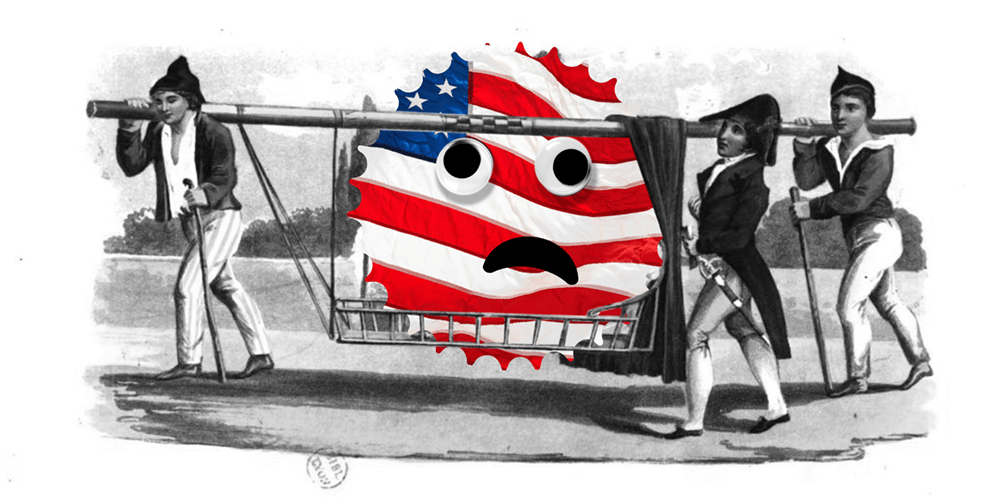The Sedan Chair Economy
Think of the world economy as a sedan chair in which the America's government and consumers are carried by the world's producers.

Through most of economic history the nations that produced the most had the most valuable currency.
Today, the nation which consumes the most has the most valuable currency.
It's an absurd system and is coming to an end.
How we got here
The Sedan Chair Economy was created in 1944 at the Bretton Woods conference, where the US dollar replaced the British pound as world reserve currency.
Japan, Germany and other nations had been devastated by WW2 and desperately needed dollars to rebuild.
Helped by the Marshall Plan and other US government programs, these nations became extremely productive and earned the dollars they needed by sending real goods and services to the US.
At first, the international dollar system was a good deal for everyone. Dollars were scarce and worth working for, and when a nation had too many it could swap their dollars for gold. Back then people had the idea that gold was more valuable than paper currency.
Problems Emerge
The international dollar system encouraged the United States to consume more and more and produce less and less.
This felt good in the short term, but it began a decades-long process which destroyed the productive parts of the US economy and created a credit-fueled consumption economy.
The Chair Gets Heavier
By the 1960s France – among other nations – had exported a lot of stuff to the United States, so had earned a lot of dollars, which meant their central bank was owed a lot of gold by the US.
President De Gaulle worried about the expense of the Vietnam War, so tried to swap the dollars France had earned for gold
This threatened a run on the US gold hoard, and led to the Nixon Shock of 1971.
Shortly after that the United States forced Saudi Arabia into the petrodollar system. This also meant forcing the rest of the world to need US dollars.
Linking the dollar to oil allowed the US to consume more and more of the world's labour and resources … Because anyone buying selling or selling oil had to have dollars. To get dollars foreigners had to send real goods and services to the United States.
This is called the 'exorbitant privilege' and it made the US much wealthier than it would be under a more normal system. This is because dollars cost almost nothing to produce, but the stuff that dollars can buy is difficult and expensive to produce.
A great deal for the US. Not so a great for the rest of the world.
If a nation works for dollars and saves those dollars over decades, it is a bad deal because of the certainty that the US will devalue dollars to escape its debt burden (as happened in 1933 and 1971).
Europe did not want to work for dollars. So in the 1970s began work to exit the dollar system. Their plans took nearly 40 years, but finally, the euro was launched in 1999. Suddenly Europe had its own currency and could stop funding US deficits.
China to the Rescue
China was fast-tracked into the WTO in 2000, and sent huge amounts of stuff to the United States in return for dollars. The world has never seen a society so economically transformed in less than 20 years.
During this period Chinese people would work for a lot less money than Germans and Japanese workers – and there are a lot more of them – so suddenly the world was awash in cheap and abundant consumer goods.

China’s arrival soon made the perils of the Sedan Chair Economy very obvious.
US consumers benefited from cheap stuff, and easy credit disguised the disappearance of manufacturing jobs.
But as jobs were outsourced, cheap goods, and synthetic drugs flooded in, making life inside the Sedan Chair deathly dangerous for hundreds of thousands of Americans in once productive parts of the country.
So Americans are angry. That collective anger is called populism. And whether from the so-called left or so-called right, it can only get worse as their currency system unravels further.
Now what?
Foreigners are winding down their purchases of US Treasuries so are not funding US deficits … And that creates unsolvable problems for the US government.
The Fed's Overnight Repo programme is one clear signal of crisis in the US financial system. It shows that the issuer of the world reserve currency is creating currency tokens out of thin air to fund itself.
This 'Argentinian' approach to currency management hasn't fully shown up in the public consciousness, but it will.
Things can only get crazier as the US dollar system winds down, and the effects will be felt everywhere, so I'll be writing more often from here on in. .
x C x
